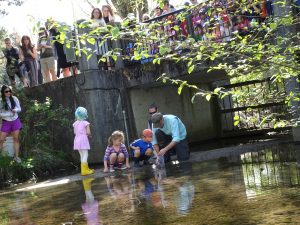As a young boy, Mark Angelo was captivated by water.
“Even though I lived in a city,” Mark said, “creeks and streams took me to another world.”

The magic didn’t dissipate with age. As a teenager, Mark joined his family on trips through the Fraser Canyon and elsewhere, soon becoming an avid paddler and fisher. These formative experiences would feed his passion for the waterways of British Columbia (BC).
After graduating from the University of Montana, Mark got a job with the Forest Service. While contemplating what his next career move might be, he noticed an opportunity on a local job board – the British Columbia Institute of Technology (BCIT) was looking for an instructor for its new Fish and Wildlife program. He applied in November 1974, and by the following month, he was on the BCIT Burnaby campus starting his career as an instructor.
From a drop to a downpour — a passion grows at BCIT
During his job interview, Mark learned that Guichon Creek ran through the campus in Burnaby. On his first day at work, he set off to explore the creek and found a dead stream, filled with garbage and debris. But the following day, after returning to the creek, he came upon an elderly gentleman who had lived in the area for 80 years, and who shared what the creek used to be like: full of fish, dotted with eagles, and visited by bears.
Mark was inspired and couldn’t help but think how great it would be to restore the stream — this was the start of his 50-year effort to restore Guichon Creek.
Over the following decades, Mark organized cleanups and started a planting program during orientation week around Guichon Creek. New students would be invited to plant trees and shrubs and learn about rewilding an environment through hands-on experience. He went on to become Program Head of the Fish, Wildlife, and Recreation Program, and later, established the Rivers Institute at BCIT which focused on the protection and restoration of rivers, streams, estuaries, lakes, and wetlands in BC.
“That’s what BCIT is all about,” Mark said. “Doing work that’s hands-on, that’s applied, that’s real life.”
Lonely work becomes a community movement
Fifty years ago, being a river advocate was often a solitary endeavour. But now, Mark shares, things are different.

“If you were a river advocate, a stream keeper, that was a lonely undertaking 50 years ago,” he explained. “Now there are stream keepers all over the place, which has been a great sign of progress.”
Mark has been able to spark his love for waterways in others, igniting movements for change locally such as with the restoration and protection of Still Creek, Britannia Creek, and the heart of the Fraser.
After founding BC Rivers Day in 1980, he brought his movement to a global stage by proposing the establishment of World Rivers Day to the United Nations in 2005. The day would celebrate our world’s waterways, and increase public awareness and stewardship of rivers. His campaign was a success, and World Rivers Day is now celebrated on the fourth Sunday of September each year by millions of people in up to 100 countries.

After retiring from BCIT in 2011, Mark remained dedicated to his work as a conservationist, paddler, educator, and researcher. In 2016, his documentary RiverBlue was released. The film chronicled his three-year journey advocating for waterways around the world. In 2020, he wrote “The Little Creek that Could; the story of a stream that came back to life”, an illustrated children’s book which tells the story of restoring Guichon Creek. His next book, “River Magic; tales from a life on 1000 rivers” will release in early 2025.
He also remains involved with Guichon Creek and will lead an interpretive guided “Guichon Creek Walk” on September 18th to mark Guichon Creek Day .
For his work, Mark has received the Order of British Columbia and the Order of Canada, our country’s highest honour. Additionally, he has received the United Nations Stewardship award and the National River Conservation award. And, alongside ABC reporter Kimberly Hunt, his work to clean up the Tijuana River in California won an Emmy Award in 2018.
In appreciation of his profound impact locally, and globally, BCIT will recognize Mark with the Institute’s highest honour, an Honorary Doctorate of Technology which will be presented at the 2025 Spring Convocation ceremonies in June. Additionally, Mark’s achievement will be celebrated at the 2024 Distinguished Awards Ceremony this November.
Read more stories about Mark Angelo:
B.C. creek buried by construction in the 60s restored
How to honour World Rivers Day, some thoughts from Mark Angelo
River conservationist Mark Angelo receives Trent University’s highest honour
Children and Chum Salmon keep Mark Angelo coming back to Guichon Creek
